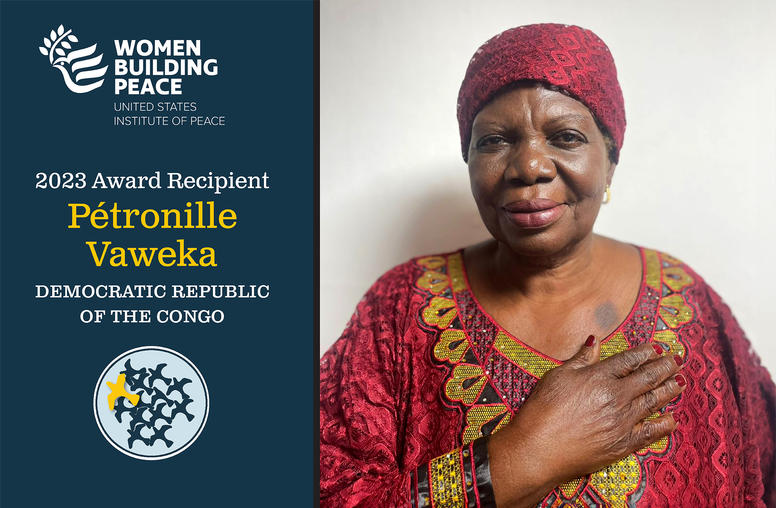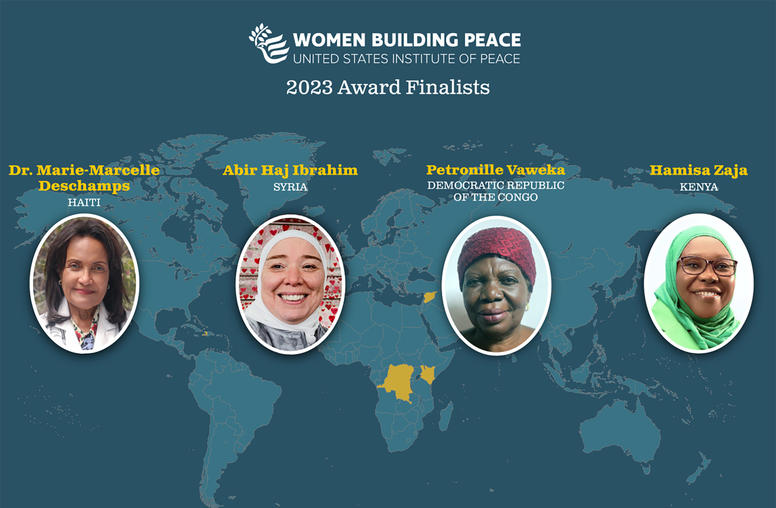New Team of Muslim World Experts at Institute
Four leading specialists join the Institute's Special Initiative on the Muslim World.
WASHINGTON—The U.S. Institute of Peace is pleased to announce that four leading specialists have joined its Muslim World Initiative. They will examine the opportunities and challenges facing the United States in its relations with the area of the world stretching from Morocco to Mindanao.
Abdeslam Maghraoui, formerly a lecturer and resident scholar at Princeton University, is the new associate director of research and studies for the Muslim World. He is joined by Christine Fair, who served as associate political scientist at the RAND Corporation; and Scott Lasensky, a former international relations professor at Mount Holyoke College. Middle East specialist Mona Yacoubian will serve as a consultant to the Initiative.
"We are extremely pleased to have such accomplished and talented scholars join our staff. They promise to enrich the work of the Institute by examining the Muslim World at a time when our understanding of and engagement with Muslim communities around the world is critical to our national interest," said Institute President Richard H. Solomon.
Maghraoui, an expert on issues of political power, authority, and legitimacy in contemporary Muslim societies, held appointments at Princeton University in the Department of Politics as well as the Institute for the Transregional Study of the Contemporary Middle East, North Africa, and Central Asia. Previously, he was director of Al-Madina, a non-profit organization dedicated to promoting accountable governance in the Arab world.
Fair specializes in security competition between India and Pakistan and Pakistan's internal security as well as U.S. strategic relations with India and Pakistan. She is also an expert in the causes of terrorism. She has conducted several analyses for the U.S. government, including an assessment of Indo-U.S. army-to-army relations; an examination of political Islam and its recent developments in Pakistan and Iran; and a comparative study of urban terrorism and state responses in Sri Lanka, Pakistan, and India.
Lasensky focuses on issues relating to the Middle East and U.S. foreign policy towards the region. He was a fellow at the Council on Foreign Relations and the Brookings Institution, and is a frequent commentator on major media outlets. Lasensky has been published in Middle East Journal, Political Science Quarterly, the Jerusalem Post, A-Sharq Al-Awsat, the Beirut Daily Star, the Christian Science Monitor, the Los Angeles Times, and the Middle East Review of International Affairs, among other publications.
Yacoubian has worked on democratization, women's empowerment, and civil society promotion for the World Bank and the Department of State. From 1990 to 1997, she served as the North Africa analyst in the State Department's Bureau of Intelligence and Research, where she focused on the crisis in Algeria.
The Muslim World Initiative was launched by the Institute of Peace in the aftermath of the September 11 terrorist attacks to address the vital foreign policy and national security challenges associated with the "Muslim World." It focuses on the threat of terrorism, religious extremism and violent conflict in this area of the world. The Initiative seeks to enhance U.S. engagement with the Muslim World through informed policy guidance and public education efforts and to promote peace and stability through activities that directly contribute to the prevention, management, and resolution of conflict. The Initiative is constructed around three cross-cutting themes: "Bridging the Divide," which explores and encourages efforts to diminish the sources of mistrust and misunderstanding that harm relations between the United States and parts of the Muslim World as well as within communities in the region; "Mobilizing the Moderates," which supports activities designed to help give voice to and empower those who advocate cooperation and non-violent solutions to conflict; and "Marginalizing the Militants," which promotes efforts to isolate and reduce the influence of the extremists who advocate intolerance and violence.
The Muslim World Initiative draws on the experience of the entire Institute to accomplish its goals. Institute programs leading and supporting efforts in the Muslim World include: the Research and Studies program, Peace and Stability Operations, Religion and Peacemaking Initiative, Virtual Diplomacy Initiative, Jennings Randolph Fellows program, and Grant program. In addition to its Washington-based activities, the Institute is also engaged in on-the-ground peacemaking efforts in key zones of conflict in the Muslim World, including Afghanistan, Iraq, Kashmir and the Philippines.

